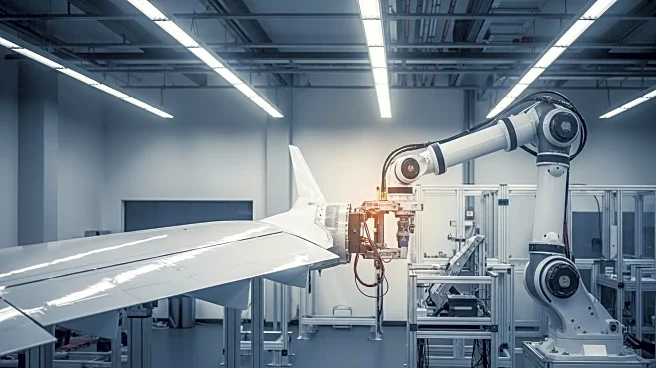What is the story about?
What's Happening?
Ford and Boeing are leveraging artificial intelligence (AI) to improve efficiency and compliance within their manufacturing processes. Ford has integrated AI-powered robotics and machine learning algorithms to enhance precision in welding, painting, and assembly, while also employing predictive maintenance to reduce unplanned downtime. Despite a decline in revenue, Ford's hybrid and commercial vehicle divisions have provided stability, with the F-150 Lightning selling 40,000 units in Q2 2025. Boeing, on the other hand, has seen a surge in aircraft deliveries, benefiting from AI-driven quality control and supply chain optimization. The company is also committed to sustainability, aligning with global decarbonization goals, although it faces financial challenges with significant net debt.
Why It's Important?
The adoption of AI by Ford and Boeing highlights a significant shift in the manufacturing industry towards digital transformation. For Ford, AI is crucial in navigating the challenges of the electric vehicle market, potentially offsetting losses from EV-related recalls. Boeing's use of AI is essential for rebuilding trust and ensuring compliance amid regulatory scrutiny. The broader impact of AI extends to midsize aerospace manufacturers, who are using AI to enhance supply chain resilience and regulatory compliance, thereby democratizing innovation and allowing them to compete with larger industry players. This trend underscores the necessity of AI in maintaining competitiveness and operational efficiency in the manufacturing sector.
What's Next?
Ford and Boeing are likely to continue expanding their AI initiatives to further enhance operational efficiency and compliance. For Ford, the focus may remain on improving EV production processes and addressing operational costs associated with recalls. Boeing's next steps could involve deepening its commitment to sustainability and exploring further AI applications to optimize production and supply chain management. Midsize manufacturers are expected to continue leveraging AI to gain competitive advantages, potentially leading to increased investment in AI technologies across the aerospace sector.
Beyond the Headlines
The integration of AI in manufacturing raises ethical and cultural considerations, particularly regarding the displacement of human labor and the need for workforce retraining. As AI becomes more prevalent, companies may face challenges in balancing technological advancement with social responsibility. Additionally, the long-term implications of AI adoption could lead to shifts in industry standards and regulatory frameworks, necessitating ongoing adaptation by manufacturers.















